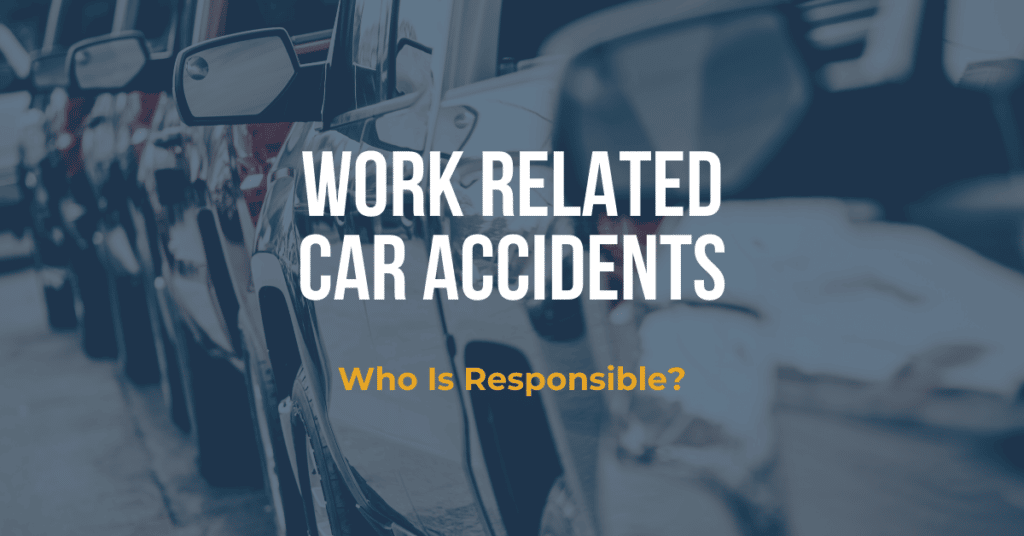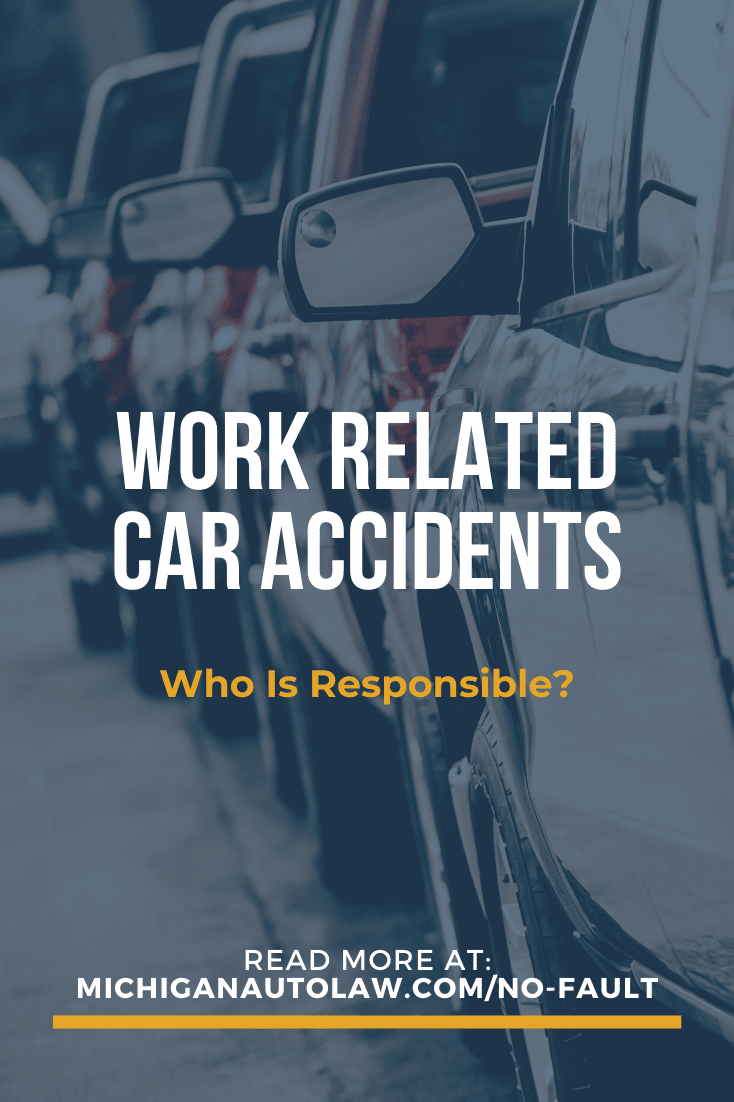Work Related Car Accidents, Who Is Responsible?

After work related car accidents in Michigan, who is responsible for paying the victim’s medical bills and lost wages as well as pain and suffering compensation? Depending on the facts of the case, it may be Workers’ Compensation, No-Fault auto insurance and the at-fault driver who caused the collision.
When is Workers’ Compensation responsible for work related car accidents in Michigan?
After a work related car accident in Michigan, Workers’ Compensation is primarily held responsible for paying a victim’s medical bills and lost wages if the victim was employed at the time he or she was injured in the collision. Workers’ Compensation pays first before other insurance, such as No-Fault.
When is No-Fault auto insurance responsible for work related car accidents in Michigan?
The No-Fault auto insurance will provide PIP benefits to victims who have been injured, but only to the extent that they are not already provided through Workers’ Compensation. No-Fault will provide extra benefits from what is provided by Workers’ Comp.
The way that Workers’ Compensation and No-Fault work together can be best seen in the context of a victim’s lost wages after a collision on the job.
Workers’ Comp carriers usually pay 80 percent of someone’s net income after an auto accident where No-Fault pays 85% in No-Fault wage loss benefits. Under these circumstances, an injured person can receive the 80 percent of wage loss from Michigan Workers’ Comp then claim the differential up to 85% of gross wages from his or her own No-Fault auto insurance company.
Importantly, No-Fault will not permit a victim to obtain a “double recovery” after having been injured in a job related motor vehicle crash. For example, if a person receives Workers’ Compensation benefits for wage loss after a job related automobile crash, he or she is not permitted to recover the same amount of wage loss compensation from his or her own auto insurance company.
When is the at-fault driver responsible?
After a work related car accident in Michigan, the injured victim may be responsible for a pain and suffering compensation claim against the at-fault driver who caused the crash. This would be separate from and in addition to any claims for Workers’ Compensation and/or No-Fault auto insurance benefits.
Unfortunately, it is not uncommon that the Workers’ Compensation insurance company tries to recoup some of the money it has paid out in benefits from the victim’s pain and suffering settlement.
Can I sue the at-fault driver for pain and suffering after a work-related car accident in Michigan?
Yes. If you were injured in a work related car accident in Michigan, you can file a lawsuit against the at-fault driver responsible for pain and suffering compensation (assuming he or she is not a co-worker or your employer).
The Worker’s Comp law’s “exclusive remedy” provision does not prohibit an injured worker from suing a third-party – such as an at-fault driver – for tort liability. (MCL 418.131(1); 418.827(1) and (5))
However, under certain circumstances, your employer or his or her Worker’s Compensation insurance company may be able to seek monetary reimbursement for what it has paid you in benefits by putting a lien on your recovery for pain and suffering compensation. (MCL 418.827(5))
The Michigan Supreme Court in Great American Insurance v. Queen has said that such a lien is authorized only if the Worker’s Comp benefits are more than a “substitute” for the benefits you would have received under Michigan’s auto No-Fault insurance. The Worker’s Comp benefits must “exceed no-fault benefits in amount or duration” and, if they do, then the lien is limited to reimbursement for the excess amount.
In terms of who is responsible for wage loss benefits after a work related car accident in Michigan, there has always been the potential for a reimbursement lien because Worker’s Comp wage loss continues “for the duration of the disability” (MCL 418.301(7) and (8)), whereas No-Fault wage loss only continues “during the first 3 years after the date of the accident.” A lien could be used to seek reimbursement for Worker’s Comp wage loss paid after the three-year No-Fault limit had been exhausted.
However, as a result of the new No-Fault law that was enacted in June 2019, there may now be the potential for reimbursement lien based on medical benefits. Prior to 2019, No-Fault was similar to Worker’s Comp because both required “unlimited” medical benefits to the extent they were reasonable and necessary. (MCL 500.3107(1)(a) and 418.315(1))
But now with the new No-Fault PIP medical benefits coverage levels, there is a new potential for Worker’s Comp medical benefits to exceed No-Fault medical in both amount and duration, thus creating the possibility for a reimbursement lien based on medical benefits. Under the new No-Fault PIP medical benefit coverage levels, drivers can choose to retain “unlimited” coverage or they can choose to cap their coverage at $50,000 (for drivers enrolled in Medicaid), $250,000, $500,000, or opt-out completely if they have Medicare. (MCL 500.3107c(1) and 500.3107d(1) and (7)(b) and (c))
In other words, suppose a person has No-Fault medical coverage with a $250,000 limit in his or her auto insurance policy. The person is injured in a work related car accident in Michigan and successfully sues the at-fault driver responsible, then his or her employer’s Worker’s Comp insurance company can file a lien against the pain and suffering recovery to seek reimbursement for Worker’s Comp medical benefits paid in excess of $250,000.
Injured and need a lawyer? Call Michigan Auto Law
If you have been injured in a work related car accident in Michigan and you have questions about who is responsible or questions about your legal rights to Michigan PIP benefits; you can call toll free anytime 24/7 at (800) 968-1001 for a free consultation with one of our experienced auto accident attorneys. You can also get help from an experienced accident attorney by visiting our contact page or you can use the chat feature on our website.






